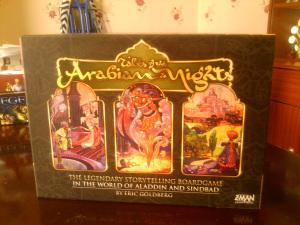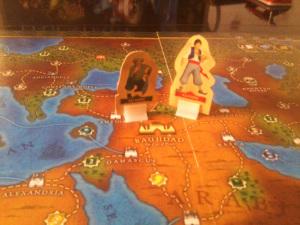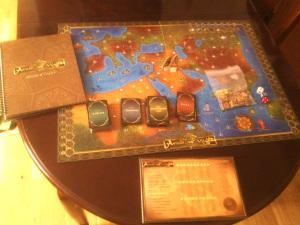
Designed by Anthony J Gallela, Eric Goldberg, Kevin Maroney and Zev Shlasinger. Published by Z-Man games.
Tales of the Arabian Nights is a storytelling game set in the world of the stories told by Scheherazade. Players will take control of one of the characters and will travel across the world, completing quests and having encounters with all manner of creatures and people. And occasionally you may even have the opportunity to discover a place of wonder. The main object of the game is to enjoy the unfolding of your story as you make decisions about what to do when you have an encounter, kind of like those old choose your own adventure books, but there is a loose framework of a game and you are also aiming to score points, which are divided between story and destiny. At the beginning of the game you will choose story and destiny points that add up to twenty and once a player reaches their targets they will announce this, and then have to return to Baghdad in order to win.

Here’s pretty much everything you need to play the game:

At the start of the game each player takes their board and will choose three skills, these may help in some encounters. Each player will take a Quest card and this will provide some impetus for character you are playing. When a Quest is completed it will give a reward, and then you will draw a new Quest. There are also Status cards, and these can be good or bad, there are Treasure cards too but the deck you will be drawing from most are the Encounter cards. After you move (and your movement is determined by how wealthy you are) you will draw a card and see who or what you are encountering. This is when the fun beings. One player will look at a reaction matrix and then you will choose from a list of reactions, and then another player will read out what happens during your encounter. Usually it’s something horribly bizarre.

Look out how thick that book is. Incredible.
I really love this game. It’s not something where you have to think and agonize over decisions, rather you just sit down and get taken along for a (magic carpet) ride. The actual winning of the game often comes as an anti-climax because I’m having so much fun that I don’t want the game to end.
I’ve played with two and three players so far, but it can go up to six I believe, possibly more. I like it with just a few people though as everyone is engaged on every turn, as you’re either making a decision or reading or checking the reaction matrix. The statuses and skills you acquire give a sense of progression and you actually do end up feeling as though you’re going through all these events. I once had a game where I had a story almost exactly like the plot of Aladdin; I was a street urchin but I made it to the Cave of Wonders and found the Magic Lamp, then I got into trouble with a Vizier and had to go back to Baghdad to clear my name and the Vizier ended up getting banished, and the Sultan was so grateful that I gained lots of wealth, ended up getting married and became Sultan myself!
Some people may not like this level of randomness though.Even if you think your decision through there’s still a good chance that something bad will happen, and in the end you just have to basically hope for the best. I see this as a good thing because it’s hilarious when your friend tries to seduce a female Genie only to have her become enraged and send him far away across the globe. But this means it can also be frustrating, especially the ‘Lost’ status. This can reduce a game to every turn being an exercise in futility for the player who is lost, and you really have to hit on the right decision, but since the game is random you’re not ever sure what decision is the right one to take.
There’s so much in that book though that there’s so much variety. And the game is one of those where time flies and you become so immersed in the tales you are weaving you lose all sense of time. Usually a game takes about two hours but I could play it for hours more. It’s relaxing, engaging and although you’re being taken along for the ride you still feel like you have a say in how it works out because you’re the one choosing how to react to these different things.
There aren’t many games like this either, and I can understand why because the book must have taken a lot of work to put together. It’s a great game though and it’s one that when I found out about it I knew I had to have it, and when I was finally able to buy it I was completely hooked. It works so well and it’s so entertaining that you end up forgetting you’re playing a board game as you’re completely immersed in the theme, and for me the best games are the ones that let you escape into the game and Tales of the Arabian Nights does this like few other games do.
